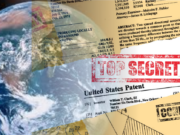
By X.R. Barra
In the English language there are often many definitions for the same word. For example the definition of ‘climate,’ per thefreedictionary.com is:
- The meteorological conditions, including temperature, precipitation, and wind that characteristically prevail in a particular region.
- A region of the earth having particular meteorological conditions.
- A prevailing condition or set of attitudes in human affairs [!]
In this article I will be discussing the recent MSM story about the “‘massive’ cyber attack on Bureau of Meteorology computer.” It had quite an effect on a prevailing condition or set of attitudes in human affairs.
On the 18th of November, 2015, Home » Media (the government) published remarks by President Barack Obama and Prime Minister Malcolm Turnbull after a Bilateral Meeting, it was stated by Malcolm Turnbull:
“Mr President, as leaders of two countries committed to freedom and always a little sceptical of government, it’s important to remember that the growth of the Internet has been largely effected without the involvement of government. [That is why] both of our countries support maintaining the current governance arrangements for the Internet so that it is largely – or is entirely governed by the Internet community, as opposed to being dictated to by governments.”
Then, almost as if by chance, the news of a massive cyber attack occurred.
In a news story from the ABC, it was claimed that China was to blame for a massive cyber attack on the computers at the Bureau of Meteorology. It claimed that multiple official sources (unnamed? official what?) have confirmed the recent attacks.
It also noted “But the ABC has been told this is a ‘massive’ breach, and one official said there was little doubt where it came from. “It’s China,” he said.” (again, the official was unnamed).
The story continued:
“Australian Strategic Policy Institute (ASPI) executive director Peter Jennings said there was evidence China was behind the hack.” Interestingly, this institute is not a government agency (although they receive funding from the government) and it does not give any credible support for its alleged evidence.”
The response from an OFFICIAL government agency was:
Statement on media reports on cyber security today (02/12/2015)
“The Bureau does not comment on security matters.
Like all government agencies, we work closely with the Australian Government security agencies. The Bureau’s systems are fully operational and the Bureau continues to provide reliable, on-going access to high quality weather, climate, water and oceans information to its stakeholders.” (Found here)
At this point, I’ve been unable to find any other official response from another government agency about the alleged attack.
On 3rd December 2015, NICK XENOPHON’s official website carried this media release:
Senate Inquiry into cyber security up for vote today, 3rd December 2015.
Following stunning revelations that the Bureau of Meteorology’s cyber security has been breached, and with it other Government Agencies, Independent Senator for South Australia, Nick Xenophon, is pushing for an urgent inquiry into cyber security.
The inquiry push, to be put to a vote in the Senate, seeks to refer to the Environment and Communications Committee a wide-ranging examination of cyber security, from an individual’s phone being hacked to government agencies’ or NGO’s data being compromised.
The terms of reference of the proposed inquiry are as follows:
- The adequacy of security for government and citizen data held or transmitted by governments, commercial entities, NGOs or citizens, with particular focus on Security (eg vetting) measures for personnel with access to government and citizen data stored or transmitted on Government, NGO and commercial entities’ IT systems
- Physical security measures for Government, NGO and commercial entities’ IT systems which store or transmit government and citizen data, including for mobile phone networks
- Methods for detecting security breaches, including the detection of mobile surveillance devices such as International Mobile Subscriber Identity (IMSI) catchers) [etc.]
Senator Xenophon has previously raised the issue of cyber security after appearing in a 60 Minutes story this year, during which it was demonstrated how easy it was to hack his mobile phone and listen to his calls.
“For too long successive governments have been asleep at the wheel when it comes to cyber security…” said Nick.
It appears that the vote will be taking place in early February when the Senate resumes sitting for 2016.
My Conclusion
The way I see this is that, weeks after discussion between Malcolm Turnbull and Barack Obama about keeping the Internet relatively free from government control, a news story broke about a massive cyber attack in Australia. This story claims to have information from unnamed officials about this event with no real evidence to support it. The result of this dramatic story has been a request for a Senate inquiry into cyber security, from Nick Xenophon.
My worry is that it’s already obvious that this story created by the MSM, and will result in an enquiry which will see the Internet being controlled by governments for the protection of all (themselves only!).






























This is a great observation X.R. Barra. We need more people joining the potential dots.
Ditto. More writers for Gumshoe, please!
Apologies for our skipping the end of the “Martin Bryant series” today. Eight ‘PA’ articles appeared this week, and there are two more, but they’re down the queue somewhere.
XR Barra, I think you could take the word “Why” out of the title and just go with “The Media Is the Biggest Cause of Climate Change.”
Mein gott! How much more of this can we take?